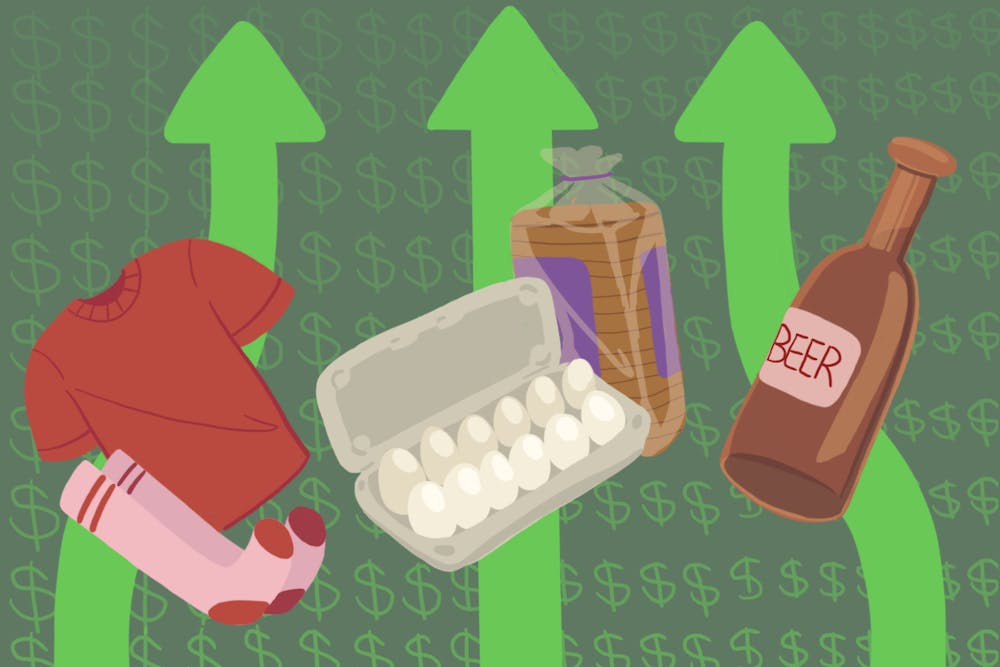Two University alumni started a business together while getting their graduate degrees. They didn't expect that less than a year after their graduation, they would be facing unforeseen economic challenges before they ever got the chance to sell their first product.
Over the past month, new tariffs on imports to the U.S. have rolled in and out, leaving business owners uncertain of the future of innovation.
On April 2, President Donald Trump announced a baseline tariff of 10% on all foreign imports, along with higher tariffs on countries with trade deficits with the U.S.
On April 9, Trump postponed the higher tariffs for 90 days but kept a tariff of 124.1% on all imports from China, according to Peterson Institute for International Economics.
Entrepreneurs within the University have been affected by the harsh and frequent changes, changing their business models and and creating a need for University resources.
The two alumni, Michael Li and Benjamin Voller-Brown, are both co-founders of Ethereal Co. — a company selling custom blackout curtains that create a sunrise effect through LED lights.
In November, Li and Voller-Brown flew to China for a month to facilitate the manufacturing of their product, Li said. While they were there, Li said they created a price point suitable for their business and enough to sustain themselves while the company was growing.
"Once the tariff was announced ... on the investor's side, that is a huge discouragement to most investors out there looking to invest into a new, small company," Li said. "If it's somebody doing a physical product, most likely 80%, 90% of the component is going to be manufactured in China."
Li said investors have been discouraged by their difficulties in creating a solid plan, as tariffs prove to be unpredictable.
"It's really hard for us to answer those questions on the investor side," Li said. "If you don't know, you can't plan anything."
To take on this obstacle, Li and Voller-Brown started a pre-sale on their product, hoping to raise money to keep their business afloat.
Matt Iacono, an ASU alumnus, is the founder of Savvy Hype Shop, a store reselling restored vintage baseball hats.
Despite working in secondhand products, Iacono said he is preparing for the effects of the tariffs as he anticipates the prices of baseball hats will increase.
As hat prices increase, Iacono said his suppliers will increase their prices as well, leaving him to raise his own.
"It's going to cost me more money, it's going to cost my buyers more money, it's going to cost the sellers I buy from more money," Iacono said. "But at the end of the day, I am fortunate enough that there is a lot of stock available to me already here in the country."
Iacono said he has already raised his prices 10% as a way to prepare for the anticipated market change.
Iacono said he advises students who are at the University and are concerned about starting a business to take as many entrepreneurship classes as they can.
"Everyone around you just wants to support you," Iacono said.
READ MORE: Students and local businesses prepare for a cost influx from tariffs
University entrepreneurial community members have suggestions on how young business owners can tackle tariffs and the trials that come with them.
Hitendra Chaturvedi, a professor for the Department of Supply Chain Management at the W.P. Carey School of Business, said business owners who sell physical products are the most at risk when it comes to tariffs.
"If they are thinking about getting those products from overseas ... there are going to be delays," Chaturvedi said. "The cost of their product is going to be very high."
Chaturvedi said if a student is looking to start a product-based business, they need a strong customer base.
"The biggest problem is not whether their customer base is only in the dorms or in a university," Chaturvedi said. "The problem is that the money that used to go a little bit further. With tariffs, it won't be able to go that far."
Li said a few priorities for business owners combating tariffs should be to create relationships with their manufacturers and avoid spending money recklessly.
In terms of using University resources, both Chaturvedi and Voller-Brown said students need to be networking and making connections through its business programs, either for advice or for potential employees.
The University's W.P. Carey School of Business at ASU is currently home to the Center for Small and Medium-sized Businesses — a program meant to assist students with obstacles in their businesses, according to its website.
The J. Orin Edson Entrepreneurship + Innovation Institute hosts Venture Devils, a place for community and mentorships with business development.
"We have amazing talent who would be willing to work and, in many cases, just for the experience," Chaturvedi said.
Despite the challenges coming with trade and imports, Chaturvedi said students should not be discouraged from starting a business.
"Wherever there is adversity, there is an opportunity," Chaturvedi said. "Somebody who is learned, who has the entrepreneurial mindset, will figure out a way to do it better than somebody who's not willing to do something there."
Edited by George Headley, Sophia Ramirez and Katrina Michalak.
Reach the reporter at ehprest1@asu.edu and follow @ellis_reports on X.
Like The State Press on Facebook and follow @statepress on X.
Ellis Preston currently works as a digital producer for The State Press and is in her third semester. Previously Ellis was a full-time politics reporter with The State Press. She is also affiliated with Arizona PBS where she works in their marketing department, and with Arizona Capitol Times as an intern.




